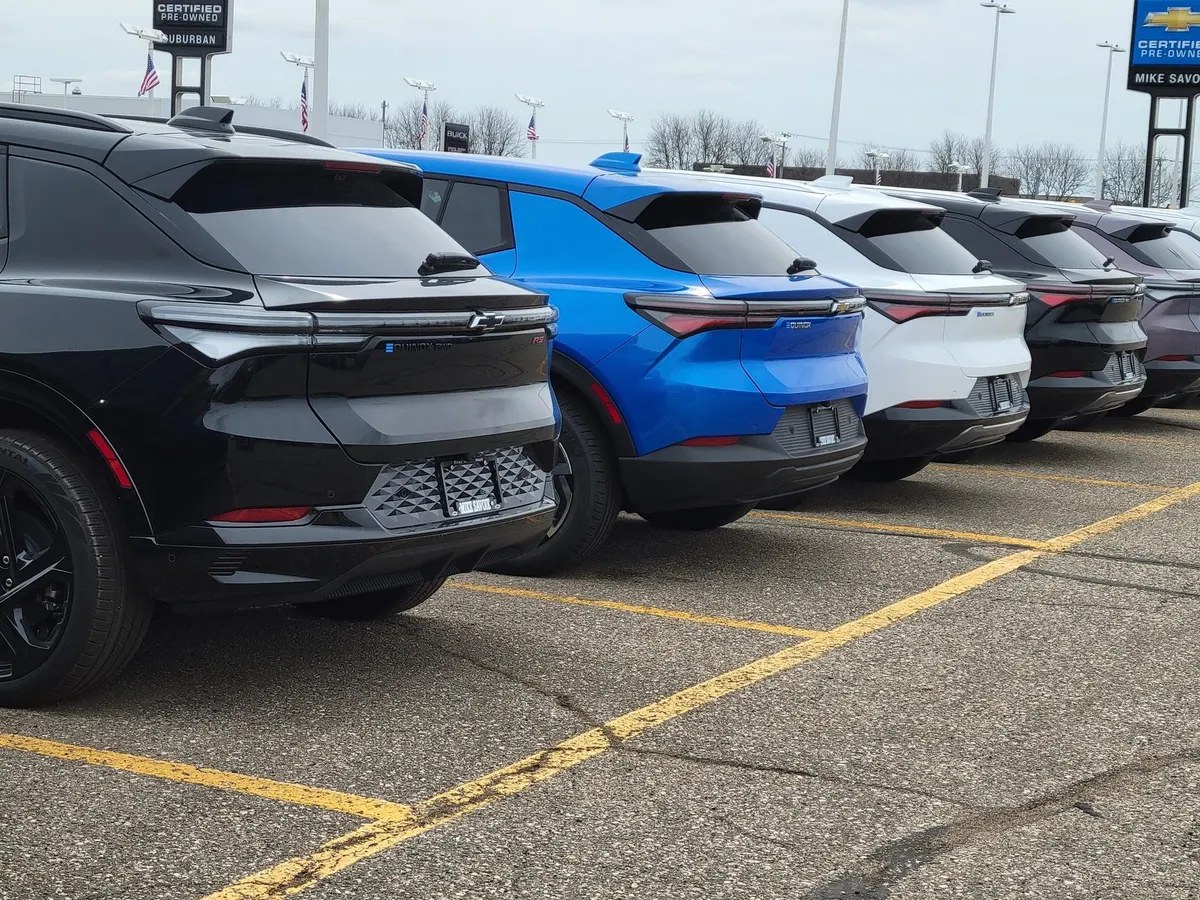By Ed Garsten,Senior Contributor
Copyright forbes

Electric vehicles on a dealer lot in Troy, Michigan.
A split decision on electric vehicles, unanimous support for greater use of artificial intelligence and an upside attitude towards dealership consolidation–all elements for future survival.
That’s the gamut of thought espoused by the head of a large dealer group and two executives at a company that specializes in dealership mergers and acquisitions during last week’s Automotive News World Congress in Detroit.
The EV divide
Sales of battery electric vehicles increased over the past few years, but not nearly at the rate automakers had hoped. But sales spiked over the summer when shoppers ready to make the EV plunge rushed to buy one before $7,500 federal tax credits expire at the end of September.
What happens to EV sales after that is subject to debate, but David Hult, CEO of the Duluth, Georgia-based Asbury Automotive Group is skeptical.
Asbury Automotive Group CEO David Hult (left) discusses dealership issues with KC. Crain, CEO at Crain Communications during the Automotive News World Congress in Detroit on September 11, 2025.
“The tax credit was a benefit. But accepting, you know, if your average consumer is 40 years old purchasing a vehicle, and this is brand new technology to them, and if they don’t own a home and don’t have access to charging, there’s a lot to be thinking about and how you have to handle that, and then first generation technology isn’t as good as what it can do in 10 years,” Hult said during a conversation with Crain Communications CEO KC Crain at the conference.
He believes the transition to electric vehicles will occur “over time” but bluntly put the blame on the federal government for that transition’s sluggish start.
“The mistake, in my opinion, was made by the government pushing it too fast, too hard,” asserted Hult. “They were putting too much pressure, from my perspective, on the manufacturers without an infrastructure support.”
MORE FOR YOU
A more optimistic view of EVs and electrified vehicles came during a conversation with Brian Traugott, chief of staff at the Dave Cantin Group, which brokers dealership sales, mergers and acquisitions.
Brian Traugott, chief of staff, Dave Cantin Group. The company specializes in car dealership mergers and acquisitions.
Dave Cantin Group
“We’re a believer, and you hear it here today, time and again, we’re moving forward in an industry that’s going to have multiple powertrains. We don’t believe that the EVs and hybrids are going anywhere anytime soon,” Traugott said during an interview on the sidelines of the conference.
He agrees with Hult that government pressure prior to Donald Trump taking office caused dealers to make costly investments in equipment and training to accommodate the hoped for faster transition.
Now that the Trump administration has pulled its support for EVs, including the expiration of the federal tax credit and financing for a national recharging network, the pressure on dealers has ebbed, but Traugott believes the investments remain sound moves.
“There’s been a lot of expense that has gone into EVs but I think dealers see it as you know, kind of that hedge bet,” said Traugott. “We can’t ever advise enough that you got to take the long term lens and cost now versus the effects on maybe your future enterprise value because you weren’t as invested in EVs or the latest and greatest in terms of technology and your facility as well.”
Real results using artificial intelligence
Who doesn’t like to know the progress of the pizza they ordered? That’s one of the concepts Hult sees as a sound use of AI in providing satisfaction for his service customers.
“That concept, when a consumer hands you the keys with their car, every step along the way, is sending them a message and a visualization of where their car is and what’s going on with the ability, with the ability to engage with the technician, even through chat or through pictures and that kind of thing,” Hult explained.
Indeed, Asbury Automotive is “tinkering” with AI, he said, and seeing significant results in boosting the number of service appointments its dealerships are booking.
“Four months ago we started it, we were booking 5,000 appointments a week online through this AI technology,” Hult said. “We’re now 34, 35,000 appointments a week, and it’s continuing to grow, and the conversions getting better, and the technology is getting better.”
AI is also giving the sales staff added insight into how motivated prospective customers are by interpreting the tone of online queries, Hult revealed.
The technology is creating efficiencies in other areas such as the ability to add inventory 24 hours a day and answering phones.
The result, said Hult, is tighter organizations with smaller staffs.
“When you have less people, you have an opportunity to pay more,” he explained. “I think in the next few years, there will be a hybrid approach to get away from commission as well.”
Employing AI tools has also been an important strategy for the Dave Cantin Group and its dealership clients.
To help improve dealership performance, the company has invested in an AI tool called Jump IQ that used internally to evaluate “every dealership in the country” using a number of data points as well as being used in training, Traugott explained.
But just as AI is key to dealerships in the Asbury Automotive Group, they are being put to use to boost profits on both the sales and services side at The Cantin Group’s clients.
“Look, there’s a lot of hype. There’s a lot of potential stuff that, who knows what shakes out still, we’re in the early, early innings, but we see a lot of growth opportunity to help the consumer experience, but also dealers in terms of their bottom line,” Traugott said.
Realities of consolidation
Asbury Automotive Group recently acquired The Herb Chambers Companies and its 33 dealerships, a $1.45 billion transaction.
Earlier this month, Dave Cantin Group brokered the sale of three Florida dealerships by Lithia and Driveway, the biggest dealership group in the U.S.
Indeed, the number of dealership owners has declined as owners of single or only a few stores sell out to large groups.
Chart from NADA report showing decline in number of dealers owning one to five light vehicle dealerships.
In 2024 91% of dealership owners held one to five stores, according to the National Automobile Dealers Association 2024 full report. That’s down from 91.6% in 2023 and 94.8% in 2015.
“There’s plenty of great local dealerships that are still the lifeblood of their community,” said Traugott. “But we every day, as you see in reports, another group is growing and a family’s legacy is successfully being transitioned to the next generation, or a new company taking over. It does help kind of control some of that fear of consumers being there’s only one person I can buy from this whole entire city.”
So while the number of dealership owners may be declining, takeovers of so-called mom and pop stores by large, well-financed groups, may actually be a benefit to consumers, asserts Robin Pate, vice president of marketing at Dave Cantin Group.
“So now they’re offering things like mobile service to better serve the customer,” said Pate in an interview. “They’re offering things like collision repair and car wash. So whenever they have these big groups, they can offer things like that.”
For Asbury Automotive, the move was aimed at giving the company a presence in the lucrative New England region, according to Hult.
The key to success, he explained is not attempting to impose changes that do not make sense for the organization and market.
“Growing up working for a lot of different dealers, it’s having a lot of respect for the dealer body and what they built, and I really focus on making sure that we could be a good steward going forward,” he explained.
Editorial StandardsReprints & Permissions



